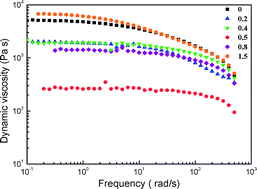Strong decrease in viscosity of nanoparticle-filled polymer melts through selective adsorption†
Abstract
The melt viscosity of poly(propylene) is found to reduce dramatically through the addition of a minute amount of

* Corresponding authors
a Laboratory of Polymer Technology, Department of Chemical Engineering and Chemistry, Eindhoven University of Technology, P.O. Box 513, Eindhoven, The Netherlands
b Materials Technology, Department of Mechanical Engineering, Eindhoven University of Technology, P.O. Box 513, Eindhoven, The Netherlands
c Dutch Polymer Institute, P.O. Box 902, Eindhoven, The Netherlands
d DSM Research, P.O. Box 18, Geleen, The Netherlands
The melt viscosity of poly(propylene) is found to reduce dramatically through the addition of a minute amount of

 Please wait while we load your content...
Something went wrong. Try again?
Please wait while we load your content...
Something went wrong. Try again?
S. Jain, J. G. P. Goossens, G. W. M. Peters, M. van Duin and P. J. Lemstra, Soft Matter, 2008, 4, 1848 DOI: 10.1039/B802905A
To request permission to reproduce material from this article, please go to the Copyright Clearance Center request page.
If you are an author contributing to an RSC publication, you do not need to request permission provided correct acknowledgement is given.
If you are the author of this article, you do not need to request permission to reproduce figures and diagrams provided correct acknowledgement is given. If you want to reproduce the whole article in a third-party publication (excluding your thesis/dissertation for which permission is not required) please go to the Copyright Clearance Center request page.
Read more about how to correctly acknowledge RSC content.
 Fetching data from CrossRef.
Fetching data from CrossRef.
This may take some time to load.
Loading related content
